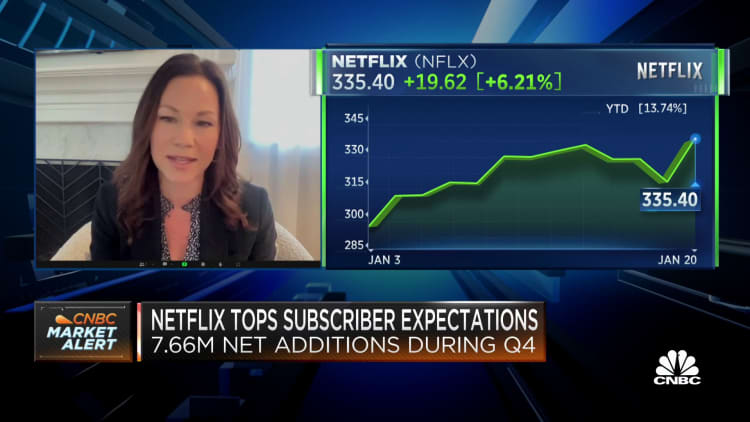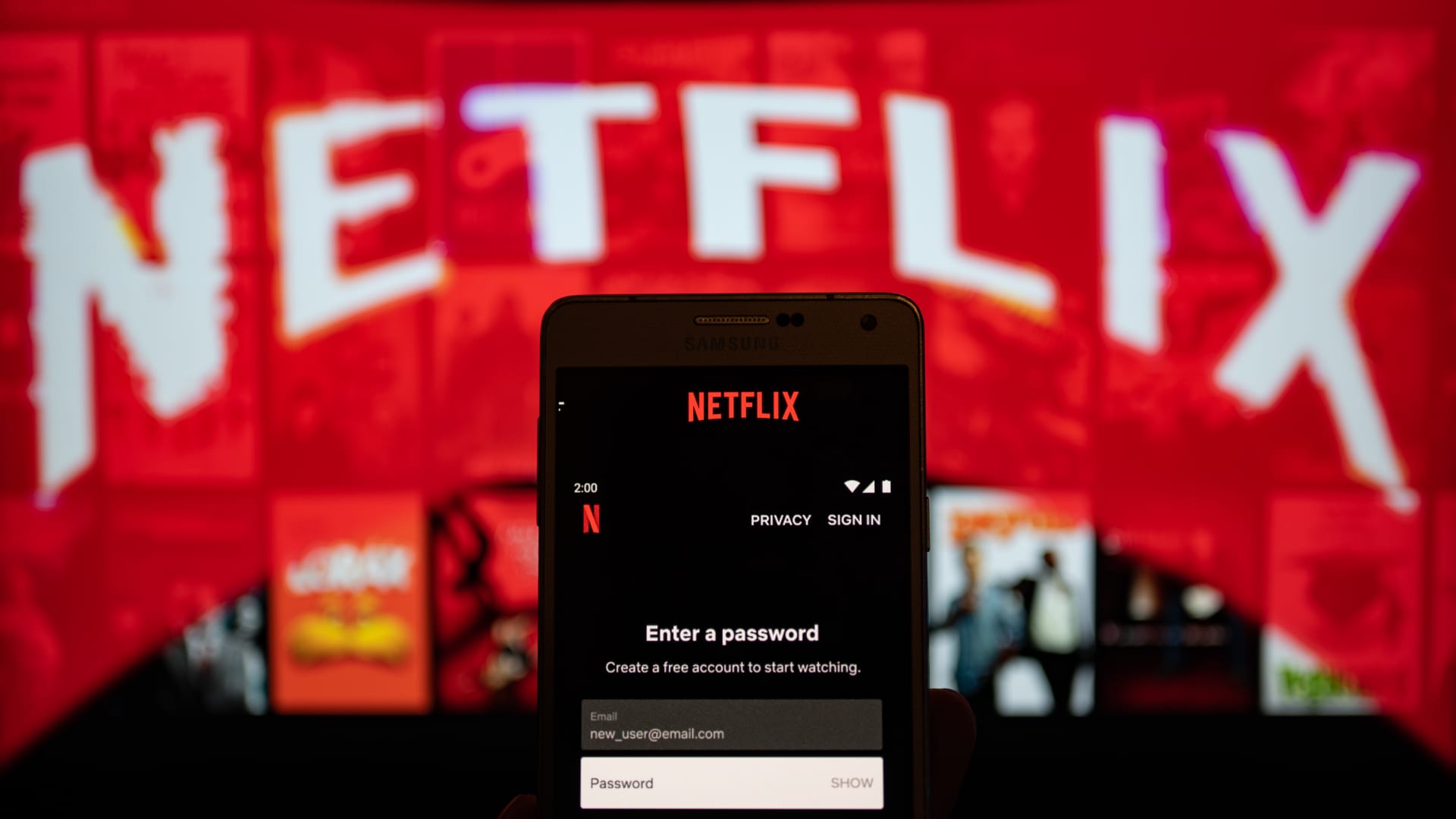How the end of Netflix password sharing will change the way families watch, especially the ones with college-age children
Nurphoto | Nurphoto | Getty Images
Is sharing a Netflix password cybercrime?
It will soon become, mostly, a thing of the past if the world’s largest streaming service has its way. After experimenting with a plan to crack down on password sharing in Latin America, Netflix will launch the U.S. version of this subscription identification tracking technology in March, but has been quiet on the details of how it will work. That is, until earlier this week, when a Netflix FAQ page change picked up on by the press indicated that any user watching from an account’s non-“primary location” could receive a temporary code to verify use for up to seven days maximum — to cover legitimate account user travel. But that FAQ page was later updated again to remove those details.
At stake: The future of the 100 million-plus households the company says share passwords, more than 40% of the company’s 231 million paid memberships. And beyond that, how all of the media companies migrating the last generation of linear cable subscriptions to the internet handle a financial environment in which there is a more pressing need to generate returns on the high costs of streaming. The days of Netflix’s Twitter account and HBO’s former chief Richard Plepler saying a media company’s primary goal was getting people “addicted” to streaming are over. Back in 2014, allowing people to share passwords was a “terrific marketing vehicle for the next generation of viewers,” Plepler once told BuzzFeed. A decade later, the next generation’s time to pay has come.
And yes, it looks like the crackdown may include families who share passwords with kids who are away at college.
Netflix’s terms of use limit sharing of passwords to people who live together in the same location, indicating that college kids may not be allowed. There’s a fine point here: College students often don’t change their permanent address until after they graduate. Even two analysts who follow Netflix acknowledged that their college-aged children are piggybacking on the family Netflix account for now.
“I have a daughter in college in Florida who uses a TV to watch – that will cost I suspect $5 more per month,” said Rich Greenfield, who follows Netflix for LightShed Partners. “If she only watched on laptop or phone, I suspect it would be no incremental cost. I suspect most parents will suck up the extra cost. Whereas friends and extended family will have to get their own accounts.”
“Almost everyone I know who password-shares, it’s with their families,” said Wedbush analyst Michael Pachter. “My kids are in college, so that’s legit. I support them. She’s part of my household. The day [my daughter] is on her own, she can get her own password.”
Netflix spokeswoman Kumiko Hidaka declined to say how Netflix plans to address college students specifically. The company’s terms of use require people to live at the same location to share a password.
In testing in Chile, Costa Rica, and Peru, Netflix uses information such as IP addresses, device IDs and account activity from devices signed into the Netflix account to identify persistent sharing outside of a household. The company’s terms of use already require customers to agree to Netflix tracking this information in order to deliver the service.

In the U.S., where subscribers are allowed to use their subscriptions while traveling, the service already uses similar methods to question whether subscribers signing on from hotels or Airbnbs are who they say they are. In cases like those, the company will send the primary account holder a code that must be entered in order to go forward, which is what the since-deleted FAQ page explained, with the maximum request period for the temporary code set at seven days.
The quick solution to this, for many password sharers, is a quick text chain from the subscriber to the friend or child using the account. Kid tells mom and dad they’re about to log on, Netflix sends the code to the main account holder, and the parents send it to the kid, who enters it. Pachter said in an interview before the FAQ page update and deletion that Netflix could restrict this by imposing a short time limit on how fast the person trying to get onto the service could respond to the authentication effort. But the FAQ suggested the bigger time limit may be related to the maximum number of days that this can work.
Greenfield, more than Pachter, said that he expected Netflix to crack down on the college-age shared-password users. Netflix may use the college market as a key target for an extra-user plan, which adds $2.99 a month to bills and is now offered in Costa Rica, Peru and Chile for customers who want to add up to two friends or family members not living with them to their account.
The result could resemble the way Spotify works, where cheap add-on plans are available, or the forthcoming plan could resemble cell-phone plans that let friends and family bundle lines in exchange for lower rates.
“I don’t think I’d pay $15 apiece,” Pachter said, but he might absorb a lower rate into the family package. “I’d tell them to figure it out with your roommate. But I’m not going to not pay $16.99 [for the family]. What am I going to do – save $4?”
The company ought to leave college students alone, Pachter said, and focus on getting them to sign up independently upon graduation.
Pachter also isn’t a fan of the plan as it was briefly revealed, which he said overlooks details about how many families use Netflix. The leaked method included a 31-day lapse for any device not logged on to a primary location’s home network. But in his own home, for example, little-used TVs across many rooms might be challenged when guests or kids returning from college try to log them on.
“When Netflix blocks access to those devices at the same location, it’s going to annoy me,” Pachter said. “Also, this plan may backfire for paying customers who don’t use the service for a few months. They could get blocked and decide it’s easier to quit.'”
In Latin America, users in nations where the password-sharing enforcement is being tested who don’t qualify to be added as an extra member on an existing account can get their own for $8.99 a month. In the U.S., the cheapest option is the Basic with Ads plan, introduced in November, at $6.99 a month. The ad-supported plan isn’t available in Peru, Costa Rica or Chile yet.
Netflix announced this week several enhancements to its premium plan related to audio quality and download permissions across more devices.
Netflix’s plan is likely to include cheap options to appeal to consumers who need “a little bit of a nudge” to set up their own account, co-chief executive officer Greg Peters said in a Jan. 19 conference call.
“Part of it’s just what we call casual sharing, which is, you know, people could pay, but, you know, they don’t need to,” Peters said. “And so, they’re borrowing somebody’s account.”

For all the latest business News Click Here

